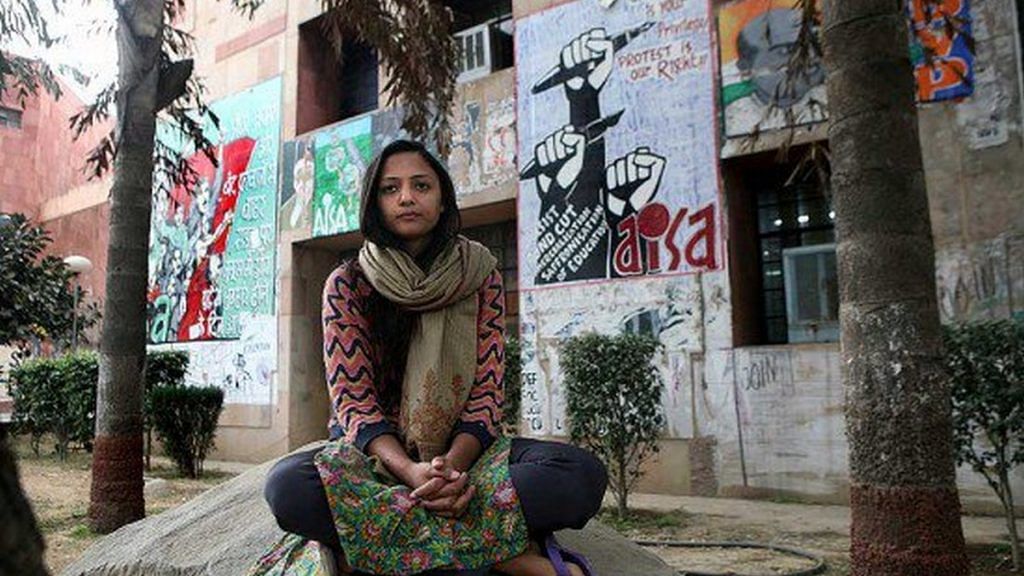Shehla Rashid claims she’s no votary of identity politics but many feel her Sinead O’Connor tweet reveals her true political ambitions.
New Delhi: A tweet by Shehla Rashid Shora, political activist and a former vice-president of the students union of Jawaharlal Nehru University, welcoming Irish singer Sinead O’Connor into the Muslim fold, set off a storm on social media.
Critics slammed Shehla, who identifies as a Marxist, feminist and an Ambedkarite, accusing her of promoting another form of ‘ghar wapsi’. But her supporters said this was ‘false equivalence’ in that O’Connor had voluntarily converted.
The ideological debate behind Shehla’s tweet apart, the timing of the comment has surprised those tracking her rise.
Shehla’s political ambitions have been well known since she rose to prominence leading protests against the arrest of the then JNU students union president Kanhaiyya Kumar, and union members Umar Khalid and Anirban Bhattacharya in February 2016.
Rumours of her holding back-channel talks with the Congress to join the party, an almost done deal with the National Conference, and negotiations with the People’s Democratic Party (PDP) in Kashmir have been doing the rounds for over a year.
Srinagar, the summer capital of Jammu & Kashmir, is Shehla’s hometown.
Also read: Why can’t Shehla Rashid celebrate Sinead O’Connor’s embrace of Islam?
Politics in Kashmir
A Kashmiri politician believes that the tweet’s political context cannot be ignored. “She has been spending a lot of time in Srinagar lately. She needs this kind of cultural capital,” said the politician from a mainstream political party in the Valley. “You can’t stay away from your mazhab (community) for long.”
Shehla had fallen foul of radical Muslim groups. In 2017, a complaint was filed against her for posting “objectionable content” against Prophet Muhammad.
She later clarified that she had shared a Facebook post that was abusing her using that content, but that did not stop Aligarh Muslim University from postponing a students’ meeting that she, among other student leaders, was scheduled to attend.
The Kashmir leader, however, asserts that Shehla’s “revival of her Muslim identity” is not only political. “Perhaps she wants to settle down in Srinagar or gain support on the ground. Build a house there, get married. She will have to make certain changes then,” the leader said.
He said that mainstream politics in Srinagar is limited when it comes to anti-establishment thought, and Shehla needs to reinvent herself to be a part of this paradigm.
Shehla’s brand of progressive thought doesn’t align with mainstream politics in Srinagar. The Kashmiri leader believes that talks with the National Conference (NC) fell through because Shehla had ideological differences with Farooq Abdullah.
Shehla asserts that she became aware of her Muslim identity on 16 May 2014.
“I remember it very clearly. As Narendra Modi became the prime minister, it hit me – I’m a Muslim,” she told ThePrint.
She also said that she is not looking at contesting elections as of now. “I haven’t taken a decision about contesting elections yet. My activism and my PhD are my priorities right now,” she said.
Also read: From Sinead O’Connor to Shuhada’ Davitt, the Irish rockstar’s transition to Islam
Not one for identity politics
Shehla has time and again insisted that she is not a votary of identity politics. “I personally don’t believe in identity politics. As you can see, I do Left politics and not identity politics,” Shehla had said in an interview with The Wire in March 2016.
She has also said that being Marxist doesn’t mean one can’t embrace religion.
According to Shehla, Marx’s remark that religion was the opium of the masses was against fatalism. “He felt religion was a hindrance to revolution. But that need not always be so,” she said. “He is speaking from a particular context; it is not the same as ours.”
